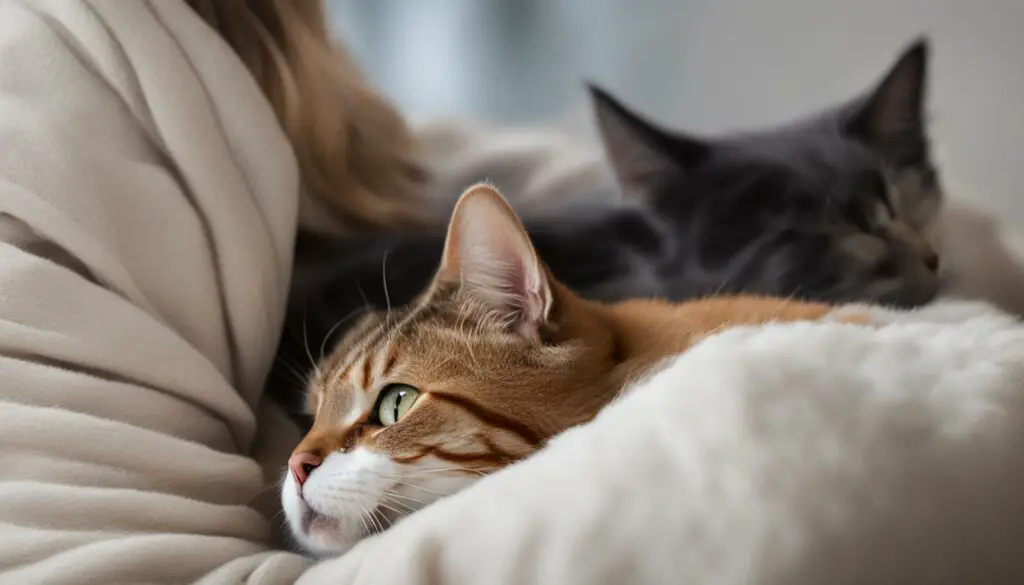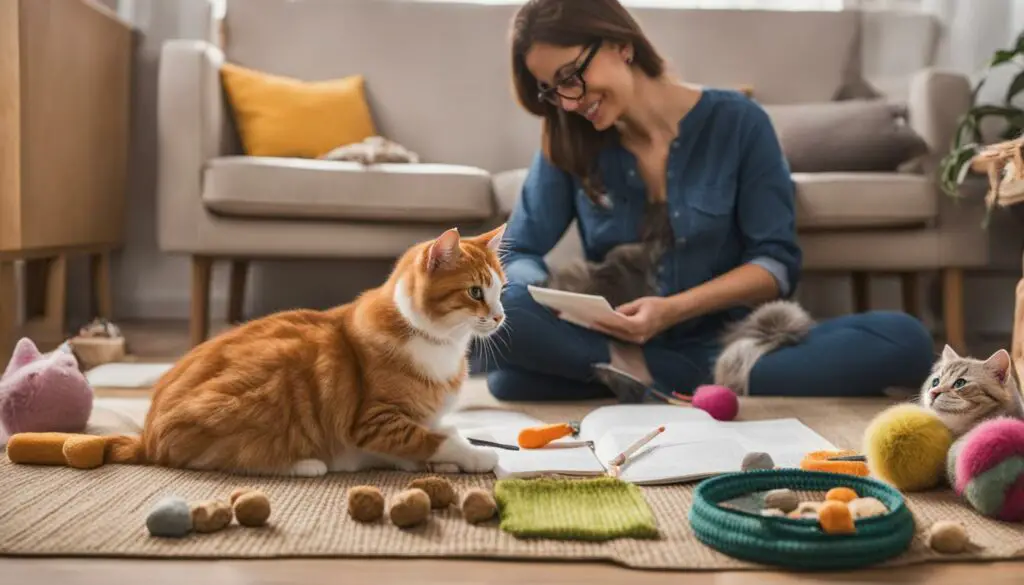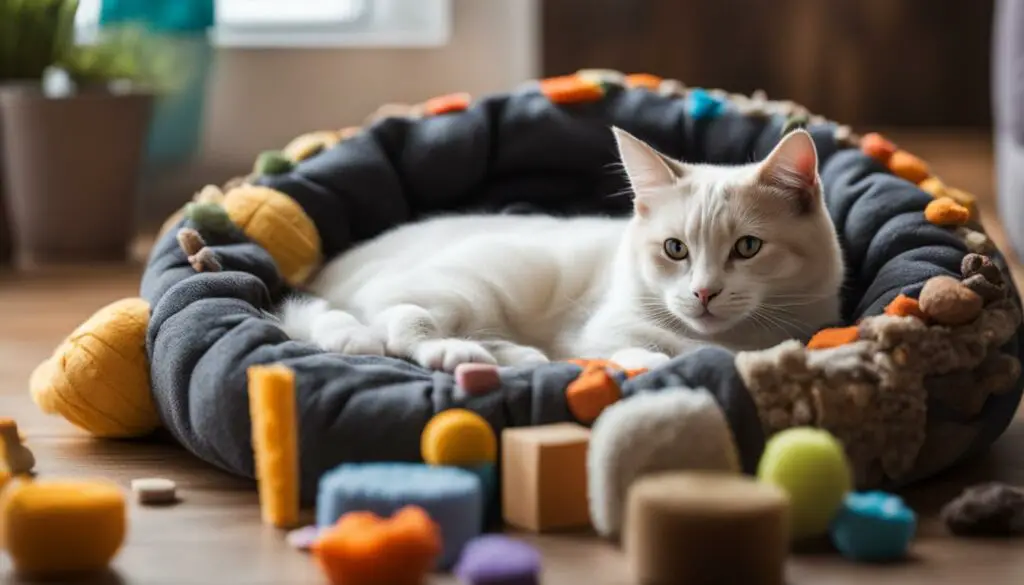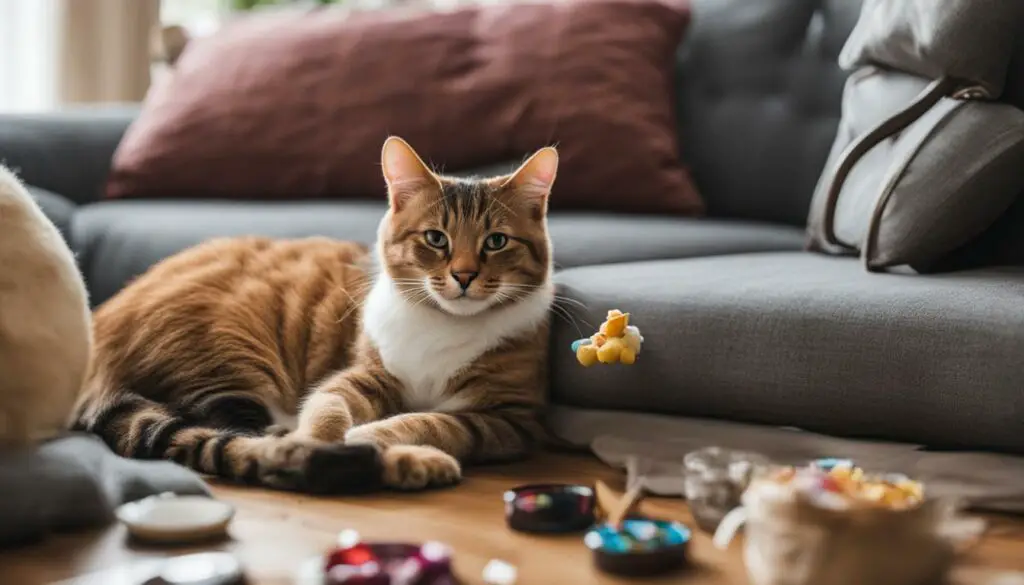Are you dealing with the overwhelming emotions of regret and uncertainty after adopting a cat? You are not alone. Many cat owners find themselves in a situation where they no longer want or are unable to care for the cat they adopted. It’s important to address these difficult feelings and seek support and advice.
When you decided to adopt a cat, you had the best intentions. However, sometimes things don’t go as planned, and feelings of regret may arise. Whether it’s due to unmet expectations, behavior challenges, or other reasons, it’s essential to navigate this journey with empathy and understanding.
In this article, we will explore the emotions and challenges that come with feelings of regret after cat adoption. We will provide guidance on how to cope with these feelings, seek professional help, and consider the well-being of both you and your cat.
Key Takeaways:
- Regret and uncertainty are common emotions after adopting a cat.
- Understanding the reasons behind these feelings can help in finding solutions.
- Seeking professional guidance from pet experts or cat behaviorists is valuable.
- Patience, understanding, and building trust are important in cat-owner relationships.
- Exploring alternatives to rehoming should be considered before making any decisions.
The Disappointment of Unmet Expectations
When we adopt a cat, we often have certain expectations about what our new furry friend will be like. We imagine a loving and affectionate companion who will eagerly snuggle up with us on the couch and greet us at the door with a purr. However, sometimes reality falls short of our expectations, and we find ourselves feeling disappointed.
It is not uncommon for newly adopted cats to exhibit behaviors that may not align with what we had hoped for. They may be shy, fearful, or seemingly uninterested in forming a bond with us. This can leave us feeling frustrated and unsure about our decision to bring them into our homes. The disappointment of unmet expectations can be a significant factor in the desire to give up or rehome a cat.
Table: Common Unmet Expectations When Adopting a Cat
| Expectation | Reality |
|---|---|
| Immediate affection and bond | Shy or reserved behavior |
| Active and playful | Lack of energy or interest |
| Social and outgoing | Fearful or cautious |
It’s important to remember that every cat is unique and may need time to adjust to their new surroundings. Patience and understanding are key when navigating the disappointment of unmet expectations. By providing a supportive and nurturing environment, engaging in positive interactions, and seeking professional guidance if needed, we can help our cats feel more comfortable and build a stronger bond over time.
Behavior and Socialization Challenges
As a cat owner, I understand the challenges that can arise when trying to bond with a cat and provide the care they need. Some cats may exhibit behaviors that make it difficult to form a connection or meet their needs. Shy or fearful cats may hide, avoid human contact, or display signs of stress, such as excessive vocalization or destructive behavior. These challenges can lead to feelings of frustration and regret, as we may question our ability to address these behaviors.
It’s important to remember that cats, like humans, have unique personalities and socialization needs. Some cats are naturally more outgoing and sociable, while others may be more reserved or cautious. This can greatly influence how a cat interacts with their owner and others in their environment. Patience and understanding are key when trying to develop a bond and help them feel safe and secure in their new home.
While it can be challenging, seeking professional guidance from a pet expert or cat behaviorist can provide valuable insights and strategies for addressing these behavior and socialization challenges. They can assess the cat’s behavior, provide advice on socialization techniques, and offer behavior modification strategies. Remember, it’s not a reflection of your ability as a cat owner but rather an opportunity to learn and grow together.
Bonding and Building Trust
Building a strong bond with a cat takes time, effort, and consistency. Engaging in positive interactions, such as playtime and gentle petting, can help to build trust and strengthen the bond between you and your cat. Creating a routine, providing a safe and secure environment, and respecting their boundaries are also essential in fostering a healthy and trusting relationship. By being patient and understanding, you can create an environment that allows your cat to feel comfortable and secure, ultimately leading to a stronger bond and a happier cat.
| Challenges | Strategies |
|---|---|
| Shy or fearful behavior | Give them space, provide hiding spots, and gradually introduce them to new people and environments. |
| Excessive vocalization or destructive behavior | Identify the underlying cause, such as boredom or anxiety, and provide environmental enrichment and mental stimulation. |
| Avoiding human contact | Allow them to approach you on their terms, use positive reinforcement when they do engage, and slowly build up trust. |
Remember, every cat is unique, and building a bond takes time. By being patient, understanding their needs, and seeking professional guidance when necessary, you can overcome behavior and socialization challenges and create a strong and loving relationship with your feline companion.

Understanding Cat Personality and Socialization
When it comes to cats, understanding their unique personalities and socialization needs is key to building a strong bond with them. Just like humans, cats have their own individual traits and preferences that shape how they interact with their owners and the world around them.

Some cats are naturally more outgoing and sociable, seeking attention and affection from their owners. These cats may enjoy being held, cuddled, and actively seek out human interaction. On the other hand, some cats may be more reserved or cautious, preferring to observe from a distance and approach interactions on their own terms.
Patience and understanding are vital when trying to develop a bond with a cat and help them feel comfortable and secure in their new home. It’s important to respect their boundaries and provide them with the space they need to feel safe. Some cats may take longer to warm up to new people or environments, while others may be more adaptable and open to new experiences.
“Cats are individuals with their own unique personalities. It’s important to respect their individuality and allow them to express themselves in their own way.”
– Cat Behaviorist
The Importance of Socialization
Socialization plays a significant role in a cat’s behavior and overall well-being. Early socialization, which occurs during their kittenhood, is crucial for helping cats develop positive associations with people, other animals, and their environment. Cats that have been properly socialized are generally more confident, adaptable, and less likely to exhibit fear-based behaviors.
However, even adult cats can benefit from socialization efforts. Patiently exposing them to new experiences, people, and other animals can help them overcome their fears and build more positive associations. Providing various forms of enrichment, such as interactive toys, scratching posts, and hiding spots, can also help to stimulate their natural instincts and keep them mentally and physically engaged.
| Socialization Tips | Fear-Free Environment |
|---|---|
|
|
By understanding and respecting a cat’s unique personality and socialization needs, cat owners can create an environment that fosters trust, promotes positive behaviors, and strengthens the bond between them and their feline companions.
Seeking Professional Guidance
When struggling with feelings of not wanting a cat anymore, it can be beneficial to seek the guidance of a pet expert or cat behaviorist. These professionals have the knowledge and expertise to assess the cat’s behavior and provide recommendations for improving the relationship between the cat and its owner. They can offer advice on socialization techniques, behavior modification strategies, and ways to create a positive and enriching environment for the cat.
Consulting with a pet expert or cat behaviorist can help cat owners gain a deeper understanding of their cat’s needs and emotions. These professionals can provide valuable insights into why the cat may be exhibiting certain behaviors and offer practical solutions for managing and addressing them. By working with a pet expert, cat owners can learn effective techniques for building trust, reducing anxiety, and improving the overall well-being of their feline companion.
“A pet expert or cat behaviorist can provide guidance tailored specifically for your cat’s unique needs and challenges.”
Working with a pet expert or cat behaviorist is not only beneficial for the cat but also for the cat owner. These professionals can offer support and guidance during what can be a challenging and emotionally difficult time. They can provide reassurance, understanding, and practical advice to help cat owners navigate the complexities of cat ownership and make informed decisions about the best course of action for both themselves and their cat.

Table: Benefits of Consulting with a Pet Expert or Cat Behaviorist
| Benefits | Description |
|---|---|
| Expert Knowledge | A pet expert or cat behaviorist has specialized knowledge and training in understanding feline behavior and can provide accurate and reliable advice. |
| Customized Solutions | They can tailor their recommendations to address the specific challenges and needs of your cat, ensuring a personalized approach. |
| Behavior Modification | They can assist in implementing behavior modification techniques to help improve undesirable behaviors and foster positive ones. |
| Emotional Support | A pet expert or cat behaviorist can offer emotional support for cat owners, helping them navigate the challenges and uncertainties that come with cat ownership. |
| Long-term Success | By working with a pet expert or cat behaviorist, cat owners can increase the chances of long-term success in creating a harmonious and fulfilling relationship with their cat. |
The Importance of Patience and Understanding
In the journey of cat ownership, patience and understanding play a crucial role in creating a harmonious and fulfilling relationship with your feline companion. Cats are unique creatures with their own personalities and needs, and it may take time for them to adjust to their new environment and build trust with their owner. Rushing the process can hinder the bond you are trying to establish.
By adopting a patient and understanding approach, you allow your cat the time and space they need to feel comfortable and secure. Take the time to observe their behaviors and body language, as this can provide valuable insights into their emotions and preferences. Respect their boundaries and give them the opportunity to approach you on their terms.
“Patience is not the ability to wait, but the ability to keep a good attitude while waiting.” – Anonymous
Creating a Nurturing Environment
One way to foster trust and a sense of security is by creating a nurturing environment for your cat. This includes providing them with a safe space where they can retreat and relax, such as a cozy bed or a hiding spot. Additionally, engaging in interactive play sessions and providing mental stimulation through toys and scratching posts can help alleviate stress and build a stronger bond.
Remember, every cat is an individual, and their journey towards bonding and trust may vary. Stay patient, be understanding, and celebrate the small victories along the way. With time and commitment, you will witness the rewarding transformation of your cat becoming a cherished member of your family.

Table: Benefits of Patience and Understanding in Cat Ownership
| Benefit | Description |
|---|---|
| Establishing Trust | Patience and understanding create a foundation of trust between you and your cat, allowing for a stronger bond to form. |
| Reducing Stress | By understanding your cat’s needs and providing a nurturing environment, you can help alleviate their stress and anxiety. |
| Promoting Positive Behavior | Patience allows you to guide your cat towards desired behaviors through positive reinforcement, fostering a harmonious household. |
| Supporting Emotional Well-being | Through patience and understanding, you can support your cat’s emotional well-being, helping them feel secure and loved. |
Bonding and Building Trust
Building a strong bond with a cat requires time, effort, and consistency. Engaging in positive interactions, such as playtime and gentle petting, can help to build trust and strengthen the bond between the cat and its owner. Creating a routine, providing a safe and secure environment, and respecting the cat’s boundaries are also essential in fostering a healthy and trusting relationship.
One effective way to bond with a cat is through playtime. Cats are natural hunters, and interactive play sessions that mimic hunting activities can help build a sense of trust and companionship. Using toys that require the cat to engage and pounce can tap into their predatory instincts and create a sense of fulfillment and enjoyment.
Another important aspect of bonding with a cat is providing a safe and secure environment. Cats are sensitive to their surroundings and need a space where they feel comfortable and at ease. Creating designated areas with cozy beds, scratching posts, and hiding spots can give the cat a sense of ownership and security within the home.
| Benefits of Bonding and Building Trust with a Cat |
|---|
| 1. Strengthened bond and companionship |
| 2. Increased mutual trust and understanding |
| 3. Improved overall well-being and happiness for both the cat and owner |
| 4. Reduced behavioral issues and stress |
Respecting the cat’s boundaries is also crucial in building trust. Each cat has its own personality and preferences, and it is important to observe and respect their individual space and comfort levels. Some cats may prefer limited physical contact, while others may enjoy cuddling and close interactions. Understanding and respecting these boundaries will help the cat feel safe and secure in their relationship with their owner.
Support from Fellow Cat Owners
During the challenging times of feeling uncertain about cat ownership, finding support from fellow cat owners can provide valuable insights and reassurance. Online cat communities and forums are an excellent resource for connecting with individuals who have gone through similar experiences. These communities offer a space to share stories, seek advice, and find guidance to navigate the complexities of cat ownership.
Engaging with other cat owners who have faced similar challenges can provide a sense of understanding and comfort. By sharing their own experiences, cat owners can gain valuable perspectives and practical tips to address their concerns. Whether it’s seeking advice on behavior issues, finding creative solutions to common problems, or simply venting frustrations, these online communities offer a supportive environment for cat owners.
Being a part of an online cat community not only provides emotional support but also enables cat owners to learn from each other’s experiences. It allows them to gain new insights into cat behavior, training techniques, and best practices for ensuring a happy and healthy cat. By connecting with fellow cat owners, individuals can build a network of support that can help them navigate the challenges and joys of cat ownership.

Benefits of Online Cat Communities:
- Access to a diverse range of experiences and perspectives
- Opportunity to seek advice and guidance from knowledgeable cat owners
- Validation and reassurance that others have faced similar challenges
- Sharing of practical tips and strategies for cat care and behavior
- Ability to connect with like-minded individuals who share a love for cats
Quotes:
“Joining an online cat community has been a game-changer for me. I’ve found so much support and advice from fellow cat owners who truly understand what I’m going through. It’s comforting to know that I’m not alone in my struggles and that there are others who have overcome similar challenges.” – CatParent23
“The online cat community has been a lifeline for me. I’ve learned so much from experienced cat owners and received invaluable guidance on how to address behavior issues with my cat. I don’t know what I would have done without this support network!” – FelineFriend22
Table: Comparison of Online Cat Communities
| Community | Features | Membership | Active Users |
|---|---|---|---|
| CatLoversConnect | Discussion forums, expert Q&A, cat care resources | Free and premium options | 10,000+ |
| FelineFriendsOnline | Community chats, photo sharing, adoption support | Free membership | 5,000+ |
| PurrfectAdvisors | Live Q&A sessions, behavior consultations, training tips | Membership subscription | 2,500+ |
Exploring Alternatives to Rehoming
When faced with challenges in cat ownership, it’s important to remember that rehoming should be considered as a last resort. There are various alternatives and solutions that can be explored to address these difficulties and find a resolution that benefits both the owner and the cat.
One alternative is to seek professional guidance from a veterinarian, behavioral expert, or animal welfare organization. These professionals have the knowledge and expertise to assess the cat’s behavior and provide recommendations for improving the relationship between the cat and its owner. They can offer advice on socialization techniques, behavior modification strategies, and ways to create a positive and enriching environment for the cat.
Another alternative is to connect with fellow cat owners who have faced similar challenges. Online cat communities and forums can be a valuable resource for finding support, advice, and guidance. Engaging with others who have experienced similar situations can provide a sense of understanding and comfort, knowing that you are not alone in your struggles.
Additionally, exploring resources such as books, articles, and educational materials on cat behavior and training can provide valuable insights and strategies for addressing specific challenges. Taking the time to educate oneself about cat behavior and needs can help in finding alternative approaches to overcome ownership challenges.
Table: Alternatives to Rehoming a Cat
| Alternative | Description |
|---|---|
| Seek professional guidance | Consult with veterinarians, behavioral experts, or animal welfare organizations for expert advice and recommendations. |
| Connect with fellow cat owners | Join online cat communities and forums to find support, share experiences, and seek guidance from others who have faced similar challenges. |
| Explore educational resources | Read books, articles, and educational materials on cat behavior and training to gain insights and strategies for addressing specific challenges. |

By exploring these alternatives, cat owners can find effective solutions to overcome the challenges they may encounter, allowing them to create a harmonious and fulfilling relationship with their feline companions.
Considering the Cat’s Well-being
When contemplating giving up a cat, it is essential to consider the cat’s well-being and best interests. Cats form strong emotional bonds with their owners, and disruption to their living situation can cause significant stress and anxiety. Before making any decisions, it is crucial to explore all options and ensure that the cat is placed in a loving and suitable home where its needs can be met.
Responsible pet ownership involves prioritizing the cat’s physical and emotional needs. This includes providing a safe and secure environment, regular veterinary care, nutritious food, and sufficient exercise and mental stimulation. It also means being attentive to the cat’s socialization and psychological well-being, ensuring that it has opportunities for play, interaction, and affection.
Additionally, responsible pet ownership involves acknowledging the commitment and responsibility that comes with owning a cat. Recognizing that cats have long lifespans and may require care and attention for 10 to 15 years or more is essential. It is important to be prepared for the financial implications of cat ownership, including expenses such as food, veterinary care, litter, and toys.
The Importance of a Suitable Home
Providing a suitable home environment is crucial for a cat’s well-being. Cats thrive in a space that allows them to exhibit natural behaviors, such as climbing, scratching, and exploring. It is important to provide a variety of vertical spaces, scratching posts, and toys to keep the cat mentally and physically stimulated.
Creating a peaceful and stress-free environment is also vital. Cats are sensitive to changes in their surroundings and can become anxious or fearful in noisy or chaotic environments. Minimizing loud noises, providing hiding spots, and ensuring a consistent daily routine can help the cat feel secure and at ease in its home.
| Aspect | Consideration |
|---|---|
| Physical needs | Provide nutritious food, regular veterinary care, and a safe, clean living space. |
| Emotional needs | Offer opportunities for play, interaction, and affection to promote a strong bond with the cat. |
| Long-term commitment | Be prepared for the financial responsibilities and lifetime commitment of cat ownership. |
| Home environment | Ensure the cat has vertical spaces, scratching posts, and a peaceful, stress-free environment. |
“Responsible pet ownership involves prioritizing the cat’s physical and emotional needs, acknowledging the commitment and responsibility, and providing a suitable home environment.”

By considering the cat’s well-being and adhering to responsible pet ownership practices, cat owners can ensure a happy and fulfilling life for their feline companion. It is essential to remember that cats are living beings with their own needs and emotions, and their welfare should always be a top priority.
Responsible Rehoming and Adoption Strategies
When it comes to rehoming a cat or adopting a new one, it is important to approach the process responsibly. Responsible rehoming ensures that the cat is placed in a suitable home where its needs can be met, while responsible adoption ensures that the prospective owner is prepared and committed to providing a loving environment.

One key aspect of responsible rehoming is researching potential adopters. It is essential to find individuals or families who have the time, resources, and commitment necessary to care for a cat. Conducting thorough screening processes, such as interviews and home visits, can help determine if the potential adopters are a good fit.
Similarly, individuals looking to adopt a cat should thoroughly assess their ability to provide a suitable home. They should consider factors such as their lifestyle, availability, and willingness to meet the cat’s needs. Adopting a cat is a long-term commitment, and it is crucial to ensure that one is fully prepared for the responsibilities that come with it.
| Responsible Rehoming | Responsible Adoption |
|---|---|
| Research potential adopters | Thoroughly assess one’s ability to provide a suitable home |
| Conduct thorough screening processes | Consider lifestyle, availability, and willingness to meet the cat’s needs |
| Ensure the cat is placed in a suitable home | Commit to the long-term responsibilities of cat ownership |
Responsible rehoming and adoption strategies are essential for the well-being of both cats and their owners. By taking the time to find the right fit and ensuring a smooth transition, we can create loving and lasting relationships between cats and their new homes.
Finding the Right Fit: Matching Cats and Owners
When it comes to cat adoption, finding the right fit between the cat and the owner is crucial for a successful and fulfilling relationship. Just as every cat has its own unique personality and needs, every potential cat owner has their own lifestyle, preferences, and expectations. By taking the time to understand these factors and carefully evaluating potential adoption candidates, cat owners can increase the chances of finding a compatible cat that is a perfect match for their home.
Matching cats and owners involves considering various factors such as energy level, socialization needs, and compatibility with other pets. Some cats thrive in an active environment with lots of playtime and interaction, while others may prefer a quieter, more relaxed setting. Understanding these needs can help cat owners find a feline companion that complements their lifestyle and meets their expectations.

It’s also essential to consider the cat’s temperament and personality traits when matching them with potential owners. Some cats are naturally more outgoing and affectionate, while others may be more independent or reserved. Matching the cat’s personality with the owner’s preferences can lead to a stronger bond and a more harmonious living environment.
The Journey of Growth and Adaptation
Adapting to cat ownership is a journey that is filled with growth, learning, and the development of a unique bond with our feline companions. As I embarked on my own cat owner journey, I quickly realized that owning a cat requires patience, understanding, and a willingness to adapt to their needs.
One of the first things I learned is that cats are individuals with their own personalities and preferences. It took time for me to understand and appreciate my cat’s unique traits and quirks. What I initially perceived as challenging behaviors, I came to realize were simply expressions of their individuality. By embracing their uniqueness, I was able to foster a deeper connection and develop a stronger bond.
Another aspect of adapting to cat ownership is creating an environment that promotes their well-being. Cats thrive in spaces that provide mental and physical stimulation. I learned the importance of providing enriching toys, scratching posts, and playtime to keep my cat entertained and engaged. Additionally, establishing a routine and setting boundaries helped create a sense of security and predictability in both of our lives.
Fostering a Safe and Loving Home Environment
Creating a safe and loving home environment was an essential part of my journey as a cat owner. I made sure to cat-proof my home by removing any potential hazards and providing plenty of cozy spots for my cat to rest and relax. I also learned about the significance of their litter box and the importance of maintaining cleanliness and accessibility.
Throughout this journey, I’ve come to appreciate the rewards that come with patience and perseverance. The bond that I’ve developed with my cat is one of unconditional love, trust, and companionship. I’ve witnessed their growth and adaptation to our home, and in turn, I’ve grown and adapted as a cat owner.

| Key Tips for Adapting to Cat Ownership: |
|---|
| 1. Embrace their uniqueness: Understand that every cat has its own personality and preferences. Take the time to get to know your cat and embrace their individuality. |
| 2. Provide mental and physical stimulation: Cats require mental and physical stimulation to thrive. Invest in toys, scratching posts, and interactive playtime to keep them entertained and engaged. |
| 3. Create a safe and loving home environment: Cat-proof your home, provide cozy resting spots, and maintain a clean litter box to ensure your cat feels safe and secure. |
| 4. Be patient and persevere: Developing a strong bond with your cat takes time and effort. Practice patience, and don’t give up during challenging moments. The rewards will be worth it. |
The Rewards of Patience and Perseverance
When it comes to cat ownership, patience and perseverance are virtues that can bring about remarkable rewards. Adopting and caring for a cat may present challenges, but by remaining steadfast and committed, you can forge a deep and fulfilling bond with your feline companion.
Patience is key when building a relationship with a cat. It takes time for a cat to acclimate to its new surroundings and trust its owner. By approaching your cat with patience and understanding, you create a safe space for it to explore, grow, and eventually develop a strong connection with you. Remember, each cat is unique, and the journey of building trust may differ from one cat to another. Embrace this process and let the rewards of a blossoming relationship unfold naturally.
Perseverance is equally important, especially when faced with challenges in cat ownership. Cats may exhibit behaviors that are initially difficult to understand or manage. However, by persistently seeking guidance from experts, such as pet behaviorists or other experienced cat owners, you can overcome these obstacles and find effective solutions to create a harmonious living environment for both you and your cat.
Through patience and perseverance, you will witness the rewarding transformation of your cat’s personality and behavior. The once shy and reserved cat may become a loving and affectionate companion, always by your side. The joy of seeing your cat’s confidence grow and witnessing the depth of your bond is immeasurable. So, stay committed, keep learning, and enjoy the incredible rewards that come with the journey of cat ownership.
Conclusion
The journey of cat adoption can be filled with a rollercoaster of emotions and challenges. It is not uncommon to experience feelings of regret, uncertainty, or frustration when faced with unexpected difficulties in caring for a newly adopted cat. However, with patience, understanding, and support, it is possible to overcome these obstacles and build a strong and rewarding bond with your feline companion.
Throughout the cat adoption journey, it is essential to remember that each cat has a unique personality and socialization needs. By taking the time to understand and appreciate your cat’s individuality, you can create an environment that fosters trust, allowing them to feel safe and secure in their new home.
Seeking guidance from professionals, such as pet experts or cat behaviorists, can provide invaluable advice and support when facing challenges in cat ownership. Additionally, connecting with fellow cat owners in online communities can offer a sense of understanding and reassurance, knowing that you are not alone in your experiences.
Remember, the road to a fulfilling and harmonious relationship with your cat may have its ups and downs, but the rewards are worth it. By embracing the journey, committing to responsible pet ownership, and seeking help when needed, you can navigate the complexities of cat adoption and create a loving and lifelong bond with your feline friend.
FAQ
Can I give up my adopted cat if I don’t want it anymore?
Rehoming a cat should only be considered as a last resort. There are often alternatives and solutions that can be explored to address the challenges faced by cat owners.
What should I do if my newly adopted cat doesn’t meet my expectations?
It is important to understand that cats, like humans, have unique personalities and socialization needs. Patience and understanding are key when trying to develop a bond with a cat and help them feel comfortable and secure in their new home.
How can I bond with a shy or fearful cat?
Building a strong bond with a cat requires time, effort, and consistency. Engaging in positive interactions, such as playtime and gentle petting, can help to build trust and strengthen the bond between the cat and its owner.
Where can I find support and guidance as a cat owner?
Connecting with other cat owners who have had similar experiences can provide valuable support and reassurance. Online cat communities and forums can be a great resource for finding advice, sharing stories, and seeking guidance from individuals who have gone through similar situations.
What should I consider before rehoming a cat?
Rehoming a cat should be approached responsibly. Researching potential adopters, conducting thorough screening processes, and ensuring a smooth transition are all crucial elements of responsible rehoming.
How can I find the right cat that matches my lifestyle?
Understanding your lifestyle, preferences, and expectations can assist in determining the type of cat that would be the best match. Factors such as energy level, socialization needs, and compatibility with other pets should be considered when evaluating potential adoption candidates.
Is it normal to experience challenges and doubts as a cat owner?
Owning a cat is a journey filled with growth, learning, and adaptation. It is normal to experience challenges and doubts along the way. By embracing the process and seeking support when needed, cat owners can navigate these challenges and develop a deeper understanding and appreciation for their feline companions.
What are the benefits of patience and perseverance in cat ownership?
Patience and perseverance can lead to a rewarding and fulfilling relationship with a cat. Over time, as the cat adjusts to its surroundings and forms a bond with its owner, the rewards become evident. The affection, companionship, and joy that a cat can bring are priceless, making the journey of overcoming initial challenges and uncertainties all the more worthwhile.








